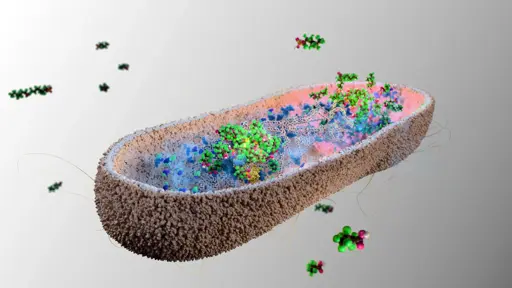Doesn’t really seem like they’ll get rid of what’s already in the bloodstream and no real mention of safety yet, but it looks promising.
I wonder if there are other ways pfas might be circulated out of the bloodstream and back into the digestive system to be collected by this microfauna.
One of the ways oats and oatmeal reduce the amount of cholesterol in your body is by binding to the cholesterol in bile so it’s excreted instead of being re-absorbed. So the cholesterol could already be in the bloodstream, converted into bile, then excretes with the oats once it’s combined. This clearly has multiple essential organs helping the process, but still, a mechanism like this could still make a difference over time.
There’s some evidence for the same mechanism of action reducing PFAS:
https://www.sciencedirect.com/science/article/pii/S0041008X24003879
https://ehjournal.biomedcentral.com/articles/10.1186/s12940-025-01165-8
Welp, I’m having oats for breakfast tomorrow 😄
Just gotta make sure they aren’t already full of microplastics.
Even better, those studies are testing dietary fibre generally, not just oats, so anyone eating their daily fruits and vegetables is already getting that benefit.
Time to start donating blood regularly. Someone else will get plastics sure, but they’ll need the blood for more pressing reasons.
I wish I was not a needlephobe as there is some indication it can be good for you the same way things that encourage your old cells to die (senolytics) are good.
Fasting is a good way to achieve that.
But as far as donating goes, there may be a day you might be the recipient of much needed blood donations.
Had a lady need 12 bags of blood after almost exsanguinating following a really complicated delivery (both survived). She never gave blood before due to fear of needles, but now is a regular blood donor because of the importance of it. She told me to not wait and just start giving.
I have a hard time believing she was a needlephobe and not more of a person who was not wild about needles as phobias do not disapear so easily.
Pregnancy changes people.
I 100% agree with this
That’s arguable. But she did her first blood donation and it took her around 3 hours.
okay. that sounds like phobia. thats how long it took to get my meningitis shot in college. walked around the quad yelling at myself in my head.
The microplastics get filtered really well in donations, so you’re definitely not doing any harm!
As long as it doesn’t hurt the PFAS industry profit margins.
/s
It will quadruple revenue - deregulation and PFAS for everyone!
Hope you can afford regular sponge bacteria cleansing baths, or you get them super-cancers real quick.I hate that we’re living in the stellaris timeline
It would suck to live in any of the empires I’ve created.
We dont deserve mandatory pampering
It’s the way the world was meant to be monetised!
The fact that this /s was even slightly needed :(
Omg, ikr?
People automatically start bitching about anything ever so slightly restricting harmful corporation’s actions even when they aren’t even involved with the profits (which also shouldn’t matter, but it’s funny that it’s not even their greed, just brainwashed by propaganda they happily repeat & would die for).
Removed by mod
Whoops, long term studies show it turns the host into a zombie after 4 years.

deleted by creator

I’ll take the whole case.
Awesome, nature finds a way. Wonder how common this removal is with other things, also, engineering one for nanoplastic removal would be a huge win!
There has been found a fungus that evolved to consume microplastics already! https://lamycosphere.com/en-int/blogs/the-futur-is-fungi/plastikfressende-pilze-sind-eine-naturliche-losung-fur-die-umweltverschmutzungskrise?srsltid=AfmBOopXsq1C4V3QswKk2bVz1-Y9NNbbDa5VhLclmQyVl-LkNqrijkvl
And a black one that consumes radiation! They’re working on a way to use that as a self healing radiation shielding in space! https://en.m.wikipedia.org/wiki/Radiotrophic_fungus
Just keep in mind how close our flesh is to plastic, chemically speaking. Anything that is really good at breaking down hydrocarbons may find us pretty tasty too.
Removed by mod
We are comprised of tangled chains of hydrogen, oxygen, carbon, with a sprinkle of various others. Plastic is slightly more complex chains, developed from the dead and entombed carcasses of ancient flora and fauna. That entombment process adjusts, but doesn’t fundamentally alter the chemistry of those chains.
Removed by mod
Estimations indicate that approximately a 21 cm thick layer could significantly deflect the annual amount of radiation received on Mars’ surface.
I’m waiting for people to start using leeches again to treat pfas in the blood.
That’s actually a valid treatment! Although really they’d probably just take a pint here and there. When you do, the body produces new, pure blood.
Yup, most efficient is to donate plasma, can reduce levels by a third in 6 months.
cries in gay and microplastic
Hmm I wonder if women have less pfas in the blood because of periods?
Likely so.
Regular plasma donation is the most effective treatment. Blood donation works, too, but you can only donate blood every two months, versus plasma donations up to twice a week.
Isn’t that just passing the PFAS on to whoever ends up getting injected with your donation?
Yes and no.
If you regularly donate, your PFAS levels will be well below average, so your blood/plasma will actually lower the recipient’s concentrations. Not quite as low as it brings down your concentrations, but still lower than average.
Further, with plasma, they extract the proteins to produce various medications. That process leaves the PFAS with the remaining, depleted plasma, which is then discarded.
But, even if your concentrations are significantly above average, and the recipient receives whole blood/plasma from you, they are only receiving 1 unit from you, adding to 8 or 9 units of their own. Their net blood concentration rises only 1/8th above average as your own concentration.
The lifesaving value of your PFAS-contaminated blood is infinitely higher than the risks posed by your PFAS.
Tl;dr: Don’t discard your blood.
Yeah, better to just do old fashioned bloodletting.
Too bad I pass out every time :(
Bloodletting all the way.
But donate it.
The pefapocalyps is coming. Why does fluor have to be such a clingy sensitive bitch clinging to cheats-with-anyone carbon? Now carbon is in a toxic relationship :(
Oh fuck I mean I would love this to be real but this is going to be abused so much in the next couple years. Supermarket shelves and social media posts will fucking be filled with drinks and pills containing (probably nonviable forms) these bacteria by the loads. Good luck everyone.
Also most of us already have enough microplastic embedded in our brains to last a lifetime.
And a few years later the bacteria is found to cause even worse diseases…
I know it’s a joke, but that’s almost certainly not going to be the case. Pathogenic bacteria have fundamentally different metabolism and genes.
What is more likely is either: ecological imbalance or the bacteria only metabolises the harmful chemicals under extreme deprivation of other carbon sources, which is never realistic, so they never do
Well I mean if people throw off their gut microbiome by overloading on this bacteria, it might still be harmful in that way. It does not need to be pathogenic in that sense.
Its actually hard to survive the human gut
But it is neutralized by microplastics…
But before that they will discover some nutrients which are very beneficial for this bacteria so people will also consume that by the loads.
That’s fucking great! I hope they are safe to use in people and make it to market soon.
Then 20 years from now, we’ll all have micro sponges in our ovaries and testicles.
Imagine talking about a bacteria that could save lives and never naming it! For those who want to know, it’s in the nature article: E.coli and pseudomonas are the ones cited in the source document, widely spread bacteria already in your gut. Sooooo…
You saved me a click!
Soooo… Regular gut biome already does this? Or are they talking about the e.coli that gives you the shits and food poisoning? Cause if its the latter, yes it will clean you quickly… Together will all liquids in your digestive system
If they’re already in my gut, does that mean I have less forever chemicals in me than otherwise?
That looks like a mitochondria, which is the powerhouse of the cell.
So you poop them out into the water and perpetuate the cycle
You shouldn’t drink poop water my friend
All water is poop water
Good enough for astronauts, good enough for , lol_idk
Everything lasts forever until it doesn’t.















